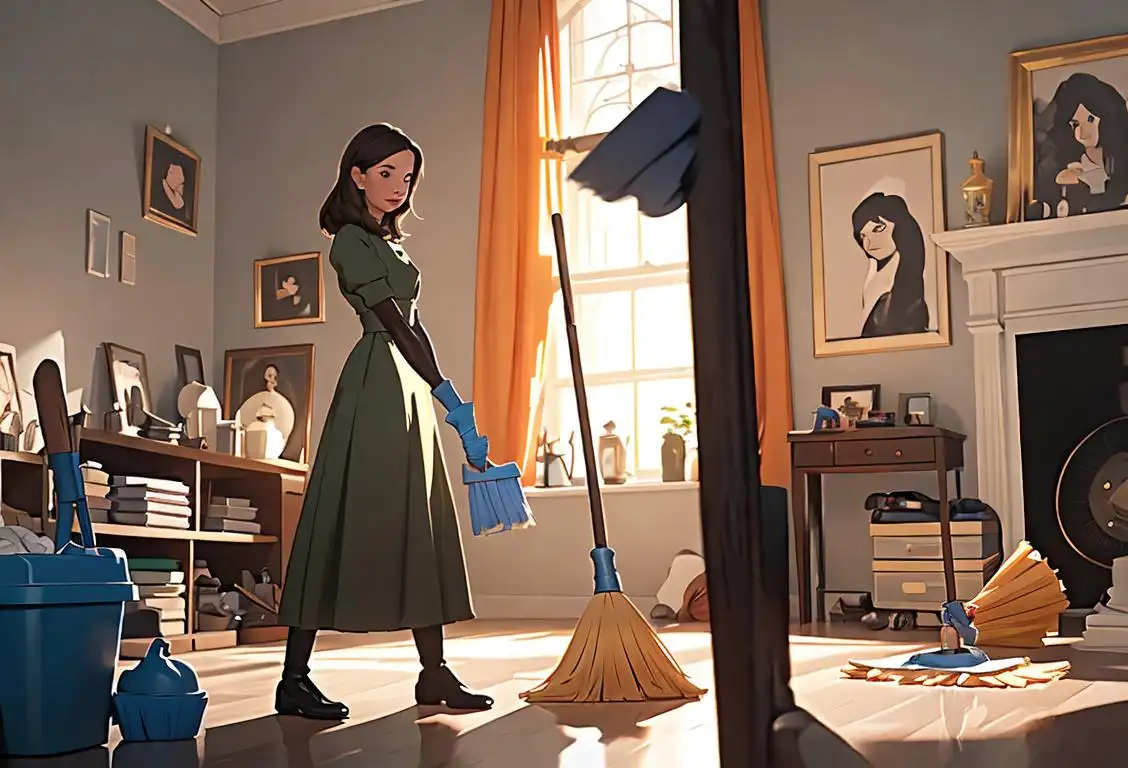National Cleaning Day

Ah, National Cleaning Day, a day that strikes fear into the hearts of dust bunnies and clutter enthusiasts alike. It's a day where we put on our superhero capes (or more accurately, our rubber gloves) and tackle the task of cleaning our homes or workspaces. Whether you're a neat freak or someone who believes in the magical powers of organized chaos, National Cleaning Day is a chance to give your space a little love and attention.
When is Cleaning Day?
It's national cleaning day on the 2nd June.
The Origin of National Cleaning Day
Surprisingly, National Cleaning Day has nothing to do with a sentient mop named Mr. Clean or a talking vacuum named Susan. Instead, it was created in response to the increasing popularity of cleaning influencers on social media. You know, those individuals who make cleaning videos go viral faster than you can say 'dustpan.'
The first mention of National Cleaning Day can be traced back to a tweet that went viral on June 2, 2018. It all started with a simple request: 'Can we have a national day dedicated to cleaning? Asking for a friend who really needs motivation.' And just like that, an internet sensation was born.
Since then, National Cleaning Day has gained traction on various platforms, with cleaning enthusiasts around the world coming together to celebrate the joy of a freshly scrubbed kitchen or a spotless living room.
History behind the term 'Cleaning'
3000 BCE
Early Cleansing Rituals
The concept of cleaning can be traced back to ancient civilizations. In 3000 BCE, the people of Mesopotamia had already developed a form of soap made from animal fats and ashes. They used these soaps to cleanse their bodies and household items. Egyptians also had similar cleansing rituals, using a mixture of vegetable and animal oils combined with alkali salts to produce soap-like substances.
600 BCE
Greek and Roman Innovations
In the 6th century BCE, the Greeks started practicing regular bathing and introduced the idea of public bathhouses. These bathhouses became popular social gathering places and were maintained using various cleaning tools and substances. The Romans later adopted these practices and improved upon them, constructing elaborate bathhouses with luxurious amenities.
10th Century
Medieval Hygiene Standards
During the Middle Ages, cleanliness became intertwined with religious beliefs. In the 10th century, the Catholic Church encouraged bathing as part of religious practice, leading to the construction of bathing facilities in monasteries and convents. The concept of personal hygiene during this period also expanded beyond religious settings.
1700s
Industrial Revolution and Modern Cleaning
The advent of the Industrial Revolution in the 18th century brought significant advancements in cleaning technology. Soap production became more efficient with the discovery of chemical processes, making soap affordable and accessible to a wider population. This period also saw the rise of cleaning tools such as brooms, mops, and vacuum cleaners, revolutionizing the way people maintained cleanliness in their homes and workplaces.
20th Century
Cleaning Products and Consumer Culture
The 20th century witnessed a boom in cleaning product innovation and consumer-oriented cleaning culture. Companies developed a wide range of specialized cleaning products for various surfaces and purposes. The introduction of washing machines and other household appliances further simplified cleaning tasks. Advertising also played a significant role in shaping consumer attitudes towards cleanliness, emphasizing the importance of a clean and hygienic lifestyle.
Present Day
Technology and Eco-Friendly Cleaning
In the present day, cleaning has become more efficient and environmentally conscious. Technological advancements have led to the creation of robotic vacuum cleaners and automatic cleaning devices. Additionally, there is a growing movement towards eco-friendly cleaning products that minimize the use of harmful chemicals, promoting sustainability and reducing environmental impact.
Did you know?
Did you know that the average person spends about 6 months of their life cleaning? That's a lot of time spent dusting, scrubbing, and vacuuming!Tagged
awareness fun propertyFirst identified
7th April 2015Most mentioned on
2nd June 2018Total mentions
541Other days
One Day
Seniors Day
Insurance Awareness Day
Happiness Day
Opposite Day
Veterans Day
Action Day
Suicide Prevention Month Day
Honesty Day
Census Day









